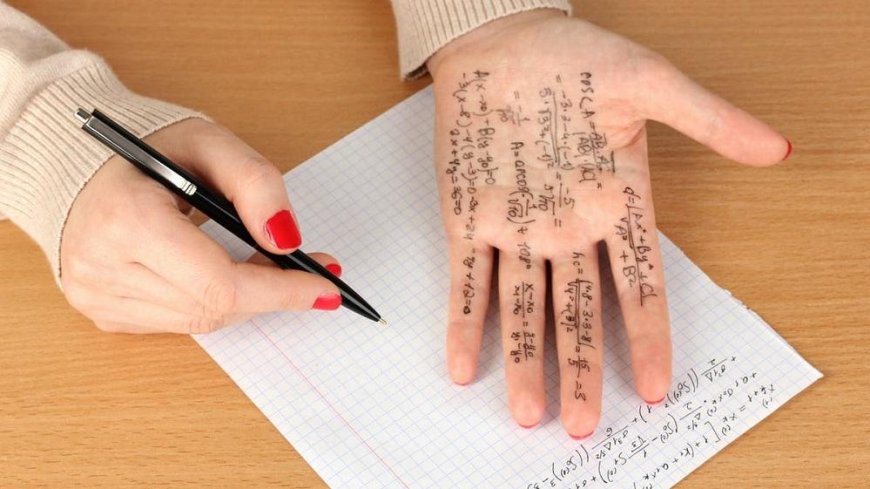Cheating - Cheating or Coping?
cheating is a sign of cleverness and resourcefulness, for others it is simply dishonest, but everyone agrees on one thing - cheating is a

Ties in sleeves, pens, rolls, and even in the hair - students try to outdo each other in ideas for getting a better grade without having to spend time studying. For some, cheating is a sign of cleverness and resourcefulness, for others it is simply dishonest, but everyone agrees on one thing - cheating is a common phenomenon in schools.
Why are we downloading?
The answer seems very simple - to get a better grade. However, good grades will not supplement our knowledge and will not allow us to acquire new skills. Some time ago, there was a popular opinion that the preparation of a cheat sheet alone allows you to consolidate knowledge and thus help students learn. However, since the finished cheat sheets can be printed from the Internet without reading them first, downloading does not have any positive value.
In almost every publication on cheating, the authors point out the need to change the approach to learning. Directing more attention from the desire to receive good grades and to compete with other students to the desire to learn would probably reduce the percentage of students who attract. Researchers who dealt with cheating in schools pointed out that the biggest problem is the consolidation of encyclopedic knowledge, which is easy to write down on cheat sheets, but more difficult to use in practice. Another problem is the huge amount of material that teachers have to hand over and students to learn. In many cases, cheating is the result of a lack of time to thoroughly prepare for each test.
The tradition of cheating in the country.
It turns out that in our country the consent to unfair exam-writing is much greater than, for example, in Western countries. Starting with the fact that there are cases of parents doing homework for their children, ending with buying diploma theses - from time to time information appears in the media about people writing academic dissertations on request. Perhaps it results from a certain tradition of combining and the desire to outsmart the body superior to us? Isn't that why students inventing more and more inventive ways to deceive the teacher become heroes among their peers? Could their creativity and enthusiasm not be compared to the ambitions of young people who in the past had secretly founded organizations and figured out how to¦ learn?
However, the diagnosis made by researchers analyzing the phenomenon of cheating is not so positive - a student becomes a dishonest student and, unfortunately, cheating also often happens at universities. So much so that when one of the students in the exam loudly noted that his friend was cheating, he became the target of student attacks all over the country. It is true that the university stood up for an honest student, but the situation shows that we are strongly desensitized to the unethical obtaining of good grades.
Must Read: Assessment “ how to avoid the most common mistakes
What if there was no download?
For students from Western universities, cheating is unacceptable and they are surprised by the presence of this phenomenon. On the other hand, it is a shock to have an absolutely honest approach to examinations at universities abroad. On the other hand, students bring back positive "not catching" habits from foreign exchanges. Schools and universities try to fight cheating in various ways - teachers enter fragments of homework in a search engine to make sure that they have not been downloaded from the Internet; all scientific papers are verified using a special system that checks if they are not plagiarism. It is forbidden to bring electronic equipment and any unnecessary items to the exams. During tests, teachers circle around the desks, and during exams, students are seated far from each other - however, there are still people who do not hesitate to use the prepared cheat sheets. So, can we even imagine education without cheating? It seems so, but it is necessary to redirect the will to get good grades towards the will to learn.
Consequences
Cheating at school seems to be a fairly innocent practice - if a student cheats gets a higher mark on one test, will it significantly affect him? Probably if it is a one-time offense, nothing bad will happen, but if cheating becomes a habit, it can have serious consequences. If you are caught cheating while taking your secondary school-leaving examination, you may invalidate the exam. Even if the members of the commission do not notice that the student takes the exam during the exam, the Matura exam may be canceled by the person checking the works. There have been cases where the exam of students who wrote their Matura exam in one room and made the same mistake was canceled.
Some universities punish very severely for cheating - from failing the exam to suspending student's rights. However, this does not deter everyone from taking unfair exams. And yet, shaping unfair behavior in pupils and students leads to the same attitude in adult life - cheating on the employer, offices or even relatives comes much easier if we learn this from childhood to the end of the educational path.
